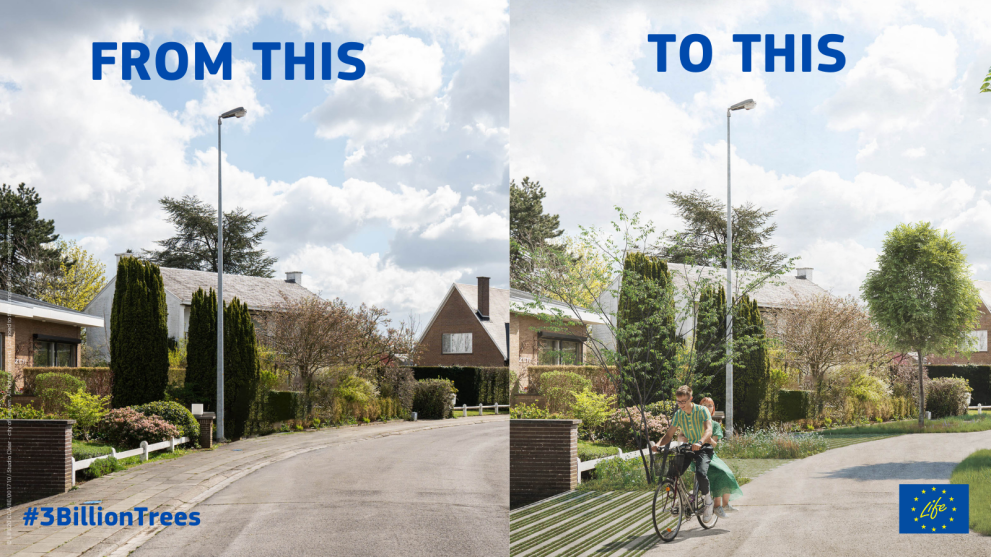
From the Belgian city of Leuven to a newly-designated UNESCO World Heritage Site in Italy, to Czechia’s Central Bohemian Uplands, LIFE projects are restoring forests, greening urban areas and supporting the #3BillionTrees campaign.
Today’s “Rooting for #3BillionTrees” conference will hear plans to plant an additional three billion trees by 2030, improving the health of European forests and tackling climate change and biodiversity loss.
In Leuven (Belgium) - one of the EU’s 100 Climate-Neutral and Smart Cities - LIFE PACT aims to reduce flooding and make the city more liveable during hot summers by expanding and preserving urban open spaces. The project embraces “de-paving” - ripping up and replacing concrete and asphalt with grass, trees and wild flowers.
Baptist Vlaeminck, who leads LIFE PACT in Leuven, says getting residents onside is vital. ‘We are working on an intensive participation process. If you present it properly you can achieve a lot. Neighbours start to make plans together and are so excited that they urge others to join. That's what you want - for the city dwellers to take over and the greening is pushed forward from below.’
As with the other two European cities involved in LIFE PACT, Madrid and Kraków, authorities and residents of the Spaanse Kroon neighbourhood in Leuven are working together to “soften and green” streets, school yards, pavements, driveways and gardens. As this recent BBC article featuring LIFE PACT highlights, using nature-based solutions such as planting trees, shrubs and grassy areas, the streetscape is cooler in summer, less prone to flooding in winter and is more attractive to insects and small mammals.
Already LIFE Pact in Leuven has held workshops with residents and has appointed an external contractor to redesign streets and footpaths. And a special therapeutic garden has been planted at the Ter Putkapelle home for elderly people.
Public participation is also vital for the success of LIFE České středohoří, a six-year project to restore large areas of species-rich grassland and forest habitats in the Central Bohemian Uplands (Czechia), close to the border with Germany.
Centuries of migration mean traditional farming and cattle breeding methods have been neglected, including forest and grassland management - allowing important sites to become overgrown and degraded. Ironically, some habitats are now also threatened by spontaneous forest and shrub encroachment – including invasive alien species, which also need to be sensitively managed. Traditional management measures methods such as grazing have become more challenging due to increased and more frequent periods of drought, when there’s a risk that extreme heat can burn large parts of the vegetation.
According to Gabriela Kubátová, LIFE České středohoří project manager, the benefits introduced by this LIFE project are multiple, not only for nature but also for the people who live here. ‘The project has created a unique opportunity for people to actively participate in change,’ she notes.
Meanwhile LIFE 4 Oak Forests - which covers sites in both Italy and Hungary - is celebrating after the Regional Park of Vena del Gesso Romagnola achieved UNESCO World Heritage Site status. The nine-year, EUR 7.9 million project aims to reverse centuries of human destruction in Natura 2000 oak forests and to restore both the trees and the wildlife which depend on them.
The project, which runs until 2026, aims to restore more than two thousand hectares across both countries, with another 200,000 ha provided with protection and management advice. More than 80 invasive species will also be targeted.
‘We’re trying to slow down or stop the degradation and to help the forests become richer in species,’ explains Pál Bódis, a forest protection manager at WWF Hungary, one of the project partners. ‘Our goal is to enable our oak forests to become more natural both in Hungary and more widely across Europe, so they survive for future generations.’
LIFE PACT, LIFE České středohoří and LIFE 4 Oak Forests are just three examples of LIFE projects helping to achieve #3BillionTrees. They also contribute to the European Green Deal, the 2030 Biodiversity Strategy, the EU Strategy on adaptation to climate change and the EU Forest Strategy.
Details
- Publication date
- 20 March 2024
- Author
- European Climate, Infrastructure and Environment Executive Agency

